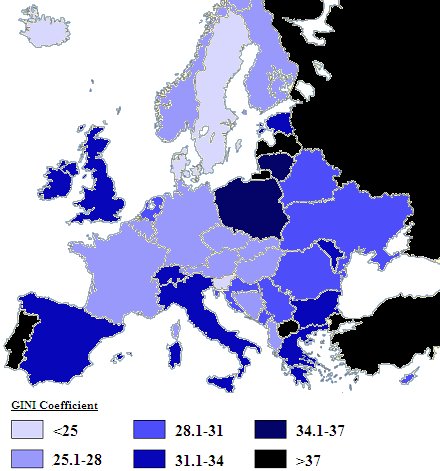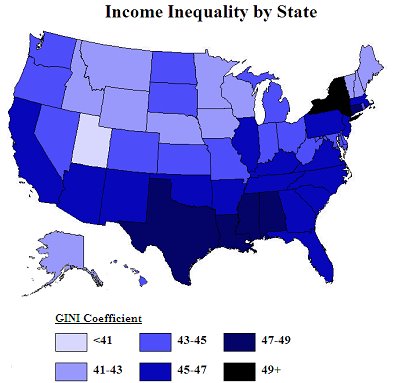The Null Device
2009/4/20
The Map Scroll blog has a map of the Gini coefficients of all the US states, and another one of Europe.
The Gini coefficient is a number from 0 to 1 representing the equality or inequality of income distribution in an economy; 0 is theoretical absolute equality, and 1 is one person having everything and everyone going without. In practice, it varies from about 0.2 to about 0.7.
According to it, Europe ranges from the mid-.20s to the high .30s, with a few outliers in the low 40s. At the most egalitarian end, unsurprisingly, are the Jante states of Denmark and Sweden, as well as Iceland (perhaps surprisingly, if it's meant to have been an experiment in cut-throat neoliberalism). Things get more inequitous into Norway, Finland, France, Germany and Switzerland (which stays under .28, despite being home to a lot of the global super-rich), and then on to Italy, Spain, Britain and Ireland, and beyond that, Poland and Lithuania. The most unequal country in Europe is Turkey, which has a Gini coefficient of 0.436, somewhere between Guyana and Nigeria, or, if you prefer, Delaware and Hawaii.
The United States is, unsurprisingly, a lot less egalitarian in income than Europe. American states' Gini coefficients range from 0.41 (the solidly Mormon state of Utah, whose state emblem is the beehive, has a Gini coefficient equivalent to Russia's) to a whopping 0.537 in the District of Columbia (comparable to the Honduras). Other states are twinned with parts of the developing world; Alabama and Mississippi are most like Nepal, California has the income distribution of Rwanda, and New York, barely under the .5 mark, is twinned with Costa Rica. According to the article, this is an astonishing state of affairs for a developed country:
According the the CIA World Factbook (table compiled here), the lowest Gini score in the world is Sweden's, at .23, followed by Denmark and Slovenia at .24. The next 20 countries are all in either Western Europe or the former Communist bloc of Eastern Europe. The EU as a whole is at .307. Russia has the highest number in Europe (.41); Portugal is the highest in Western Europe (.38). Japan is at .381; Australia is .352; Canada is .321.
And then there is the United States, sandwiched between Cote d'Ivoire and Uruguay at .450. Not counting Hong Kong (.523), the US is a complete loner among developed countries. In fact, as you can see from the map above, there is no overlap between any single US state and any other developed country; no state is within the normal range of income distribution in the rest of the developed world. Here's a list of the states with their Gini index numbers, and the country where income distribution is most comparable in parentheses:Other interesting maps on the site include a map of religious nonbelief in the UK (which points out that Scotland and Northern Ireland are the most religious, and asks whether that correlates to the Scots-Irish roots of the US "Bible belt"), of antidepressant use in England and Wales (summary: it's grim up north, and in Cornwall too; either that or Londoners prefer a line of coke), and one suggesting that, as global warming advances, Australia is ecologically fux0red.
France's National Assembly may soon have representatives for foreign locales with large French populations, such as London, as well as Germany, Switzerland, the USA and the Middle East. The plan was floated by France's right-wing president Nicolas Sarkozy. The French Socialist Party, however, claims that the move is just a gerrymander, and that studies show that French expatriates lean politically to the right.
It will be interesting to see if any other countries follow this idea. I imagine the Australian parliament could create a few electorates that way (one in London and one in Dubai, at least, with perhaps smaller seats representing agglomerations of Berlin, Tokyo and so on). If one thinks cynically of the gerrymandering aspect of this, it could profit the US Democrats to try this, given the fabled liberal leanings of Americans with passports.
In Brazil, the street finds its own uses for obsolescent US military satellites. For over a decade, Brazilians, from long-haul truck drivers and villagers out of the reach of the mobile phone networks of the cities to illegal loggers and organised crime factions, have been bouncing radio signals off a US Navy satellite system using jury-rigged off-the-shelf amateur radio equipment. The satellite system, known as FLTSATCOM to its owners, is colloquially referred to as "Bolinha", or "little ball".
To use the satellite, pirates typically take an ordinary ham radio transmitter, which operates in the 144- to 148-MHZ range, and add a frequency doubler cobbled from coils and a varactor diode. That lets the radio stretch into the lower end of FLTSATCOM's 292- to 317-MHz uplink range. All the gear can be bought near any truck stop for less than $500. Ads on specialized websites offer to perform the conversion for less than $100. Taught the ropes, even rough electricians can make Bolinha-ware.
Truck drivers love the birds because they provide better range and sound than ham radios. Rogue loggers in the Amazon use the satellites to transmit coded warnings when authorities threaten to close in. Drug dealers and organized criminal factions use them to coordinate operations.
When real criminals use these frequencies, it's easy to tell they're hiding something, but it's nearly impossible to know what it is. In one intercepted conversation posted to YouTube, a man alerts a friend that he should watch out, because things are getting "crispy" and "strong winds" are on their way. Sometimes loggers refer to the approach of authorities by saying, "Santa Claus is coming," says Brochi.One problem for the users is that the US military is still using the satellites (a replacement network isn't due online until later this year), and don't appreciate their communications being degraded by cheering football fans and random dodgy dealers. Bolinha activity is illegal, both in Brazil, and the US, and the authorities don't have too many problems triangulating the signals.
The crackdown, called "Operation Satellite," was Brazil's first large-scale enforcement against the problem. Police followed coordinates provided by the U.S. Department of Defense and confirmed by Anatel, Brazil's FCC. Among those charged were university professors, electricians, truckers and farmers, the police say. The suspects face up to four years and jail, but are more likely to be fined if convicted.("Operation Satellite?" Either something got lost in translation, or the people who name operations at the Brazilian federal police aren't the most imaginative bunch. Surely high-level operations should have cryptic, vaguely abstract names, redolent either of neo-Classical grandeur or square-jawed military machismo, like, say, "Operation Prometheus" or "Piranha December Blue" or something. But "Operation Satellite?")
In February of last year, FCC investigators used a mobile direction-finding vehicle to trace rogue transmissions to a Brazilian immigrant in New Jersey. When the investigators inspected his radio gear, they found a transceiver programmed to a FLTSAT frequency, connected to an antenna in the back of his house. Joaquim Barbosa was hit with a $20,000 fine.
(via Boing Boing) ¶ 0
